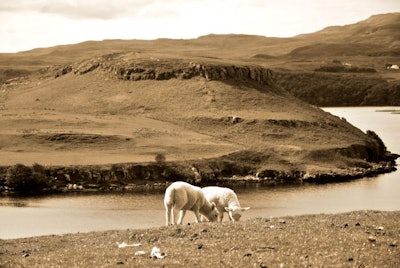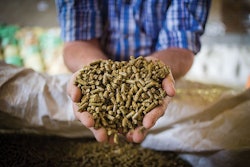
A long, cold, wet winter followed by an extended hot and dry spell has farmers in Scotland looking for ways to solve animal feed and fodder shortfalls.
“For livestock farmers, grass growth for cattle and sheep has ground to a halt, many are already feeding hay and silage that was intended for the coming winter and supplies of all feed and bedding are challenging to secure,” the National Farmers Union of Scotland (NFUS) said in a statement on its website.
“For cereal growers, early indications are that the winter barley harvest has been, at best, average. Spring barley, sown during a cold, wet spring, will see its harvest start in earnest in the coming weeks and spring barley is Scotland’s most important arable crop,” the statement said.
Stakeholders including Scotting farming associations and government representatives met this week to discuss solutions to the impending crisis.
“Exceptionally volatile weather over the past 12 months has made this a costly and difficult time for all farmers and crofters,” said NFUS Vice President Martin Kennedy. “That is having an impact that no one could have predicted. It was hugely worthwhile pulling in key stakeholders as we all work to identify short-term solutions that may address the serious shortfall in feed and fodder that is emerging.
“There is no silver bullet, but farmers can be reassured that help and advice is available from several of those round the table today.”
The NFUS listed the following required actions:
- There is a need for all to assess their fodder and bedding requirements for the winter ahead. Discussions should be had with agronomists, feed representatives and advisers on how to make the best use of what is available. Even if already completed, there is benefit in discussing your plan with others. This will allow orderly selling wherever possible.
- Encourage as many people to bale straw as they can. Those who require straw should place orders now.
- Scottish government should pay at least 90 percent of the basic payment scheme in October as they did last year.
- Scottish fovernment should bring forward the payment of all pillar 2 payments.
- The U.K. Government must investigate the possibility of paying Renewable Heat Incentive to anaerobic digestion (AD) plants who voluntarily choose to divert their distillery byproducts to animal feed.
- The government must consider the long-term impact on animal feed supply because of the growth in AD plants.
- Scottish government must request that Europe relax the three-crop rule requirement to allow growers more time to bale straw rather than plant winter crops.
- Scottish government should shorten the EFA fallow period so that it runs from April 15, 2019, to July 15, 2019, to allow a fodder crop to be grown over the autumn and be available for stock in early spring.
- Scottish government should relax its rules that require green manure crops like clover, peas and oats to be plowed in after August 15 as this could be used for fodder.
- Beef efficiency scheme roadshows in September to discuss nutrition should be opened to all livestock farmers, not just scheme members.
- Machinery rings have a database of available grazing to let. Livestock farmers should be encouraged to notify them of either their grazing availability or requirements.
- Sellers and buyers of store lambs should consider if, depending on grass availability, delivery of the stock can be deferred to a time that suits both parties.
- AHDB and SAC consulting asked to produce a factsheet highlighting the most efficient use of straw, whether it be for fodder or bedding.
In recent weeks, farmers in the United States, Australia and Germany have also sought relief from the government for losses due to drought and excessive heat.
















